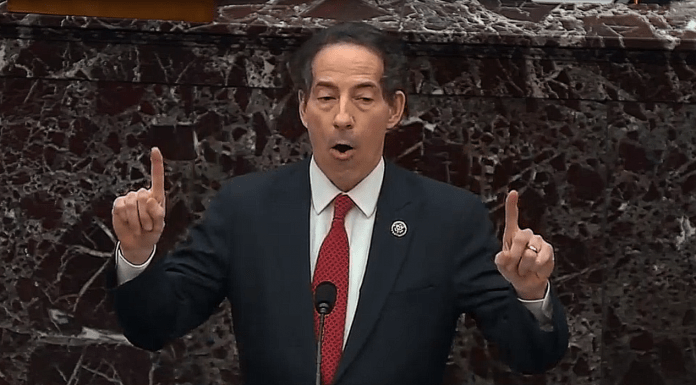Rep. Jamie Raskin, D-Md., the lead House impeachment manager, opened the impeachment do-over against President Donald Trump by promising to avoid dull, academic arguments—before immediately launching into one.
Even though Trump is no longer in office, Democrats are hoping to prevent him from a contentious 2024 election rematch.
They have maintained that the Republican party leader should be rendered ineligible to hold future office for inciting political violence, despite Trump’s rhetoric having never risen beyond the level constantly echoed by his opponents, who routinely called for—and condoned—lawless rioting and other anti-Republican confrontations.
On Tuesday, Raskin quickly set about trying to reassure senators and others watching that the exercise—which is unlikely to result in a conviction by two-thirds of the Senate—was more than a political ploy to divert attention away from the Biden administration’s sputtering start.
“Because I’ve been a professor of constitutional law for three decades, I know there are a lot of people who are dreading endless lectures about the Federalist Papers here,” Raskin said.
“Please breathe easy, OK?” Raskin continued. “I remember well W. H. Auden’s line that ‘a professor is someone who speaks while other people are sleeping.'”
Instead, he insisted, House Democrats would focus on presenting a direct case to connect Trump’s conduct and words during the Jan. 6 uprising at the US Capitol to a deliberate insurrection plot.
“You will not be hearing extended lecture from me because our case is based on cold, hard facts,” Raskin claimed. “It’s all about the facts.”
But after a short montage of carefully spliced video from the pro-Trump demonstration, Raskin immediately diverted the Senate’s attention to abstract, theoretical arguments supporting their case.
Raskin and Rep. Joe Neguse, D-Colo., focused their opening arguments on the question of whether it was even legitimate for the Senate to conduct impeachment hearings for a private citizen when the outcome of removal from office was moot.
Raskin proffered a dry explanation of why Trump would be eligible for an unprecedented post-presidential impeachment by invoking, among others, former Treasury Secretary Alexander Hamilton and former President John Quincy Adams.
Neguse heavily drew from two historic cases, which he misleadingly claimed provided precedent, although neither resulted in a conviction.
The first of these pertained to former Tennessee Sen. William Blount, accused of having conspired to sell the then-Spanish territories of Louisiana and Florida to Great Britain.
The Senate ultimately determined that Blount was ineligible for impeachment because he was a senator.
Another example Neguse cited was of William Belknap, who had resigned as secretary of War during the Ulysses S. Grant administration.
The post-Civil-War House—one of the most divided, partisan and likely corrupt bodies in US history, prior to its current iteration—voted to impeach Belknap on charges of corruption, but his acquittal by the Senate meant that the constitutionality of the original charge was never challenged or tested under law.
Contrary to the House Democrats’ deceptive arguments, Belknap’s decision to resign in order to avoid impeachment has been cited as a precedent for several other public figures—including former president Richard Nixon—who successfully halted impeachment hearings by resigning.

